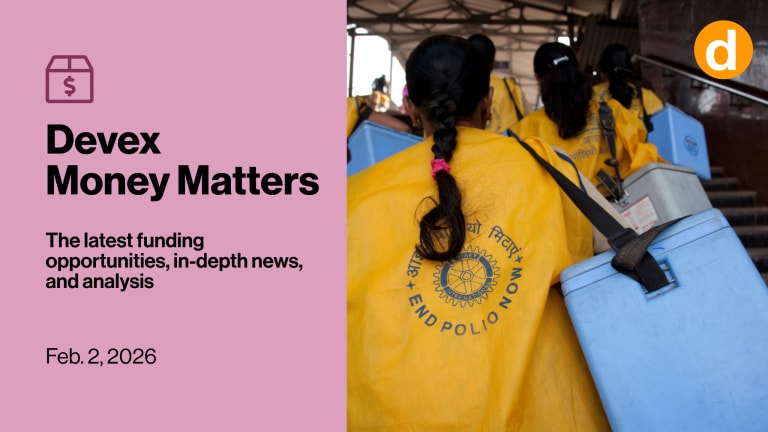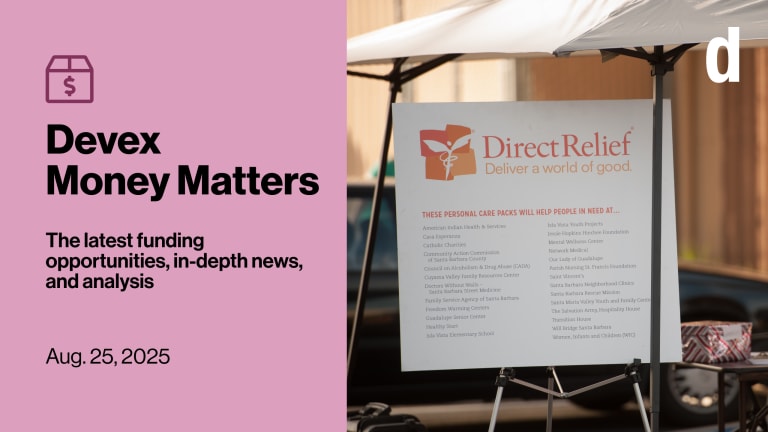
Welcome back one and all to a packed start to 2024. In the first Money Matters of the new year, we look at several pieces of significant news concerning some of the world’s biggest funders.
+ Are there topics you want to read more about in Money Matters? We want your feedback.
Funding falls
USAID funding through grants and cooperative agreements dropped sharply in the fiscal year that ended in September 2023, after years of record rises, according to an analysis conducted by my colleague Miguel Antonio Tamonan.
This is a preview of Devex Money Matters
Sign up to this weekly newsletter and get the latest in development funding in your inbox every Monday.
The agency obligated $16.2 billion through grants and cooperative agreements — $5.8 billion or 26.2% less, in cash terms, than the previous fiscal year.
A big cause of the drop was a $3.3 billion reduction in funding for the Global Fund to Fight AIDS, Malaria and Tuberculosis, but other agencies also saw significant changes in funding.
It’s perhaps worth adding a bit of context: while grant spending was down, total USAID spending for the year was up. This was due to $14.7 billion of direct payments, mostly to the International Bank for Reconstruction and Development for Ukraine.
Read: Who were USAID’s top grantees in 2023? (Pro)
+ Ready to get up to speed on the key issues in development in 2024? Join us for our next Devex Pro event, an ask-me-anything discussion with our president and editor-in-chief, Raj Kumar, on Jan. 10 at 12 p.m. ET (6 p.m. CET), and get a unique perspective on what will shape the year ahead.
+ Join us tomorrow at 12 p.m. ET (6 p.m. CET) for our first Devex Pro event of the year, an ask-me-anything discussion with our president and editor-in-chief, Raj Kumar, to get a unique perspective on the key globaldev trends that will shape the year ahead.
Not yet a Pro member?
Funding activity
We publish tenders, grants, and other funding announcements on our Funding Platform. Here are some of the ones which have been viewed the most in the past 10 days.
The Asian Development Bank is searching for a firm to support its strategy for agricultural development and food security cooperation in Asia.
The U.S. Department of State is opening a competition for a partner to offer rapid and flexible response support to women politicians and civil society leaders worldwide.
German development lender KfW is seeking consultancy services to improve the municipal infrastructure in Madagascar.
The U.S. African Development Foundation has released a request for proposals on how to improve access to sustainable energy in Africa.
The World Bank has signed a $68.5 million loan to accelerate the digital transformation in Gabon.
+ Try out Devex Pro Funding today with a free five-day trial, and explore funding opportunities from over 850 sources in addition to our analysis and news content.
Locally led
One of USAID’s key localization promises is that by the end of the decade, half of its programs would “place local communities in the lead to either co-design a project, set priorities, drive implementation, or evaluate the impact of our programs.”
But until recently, it’s not been very clear what this might mean in practice.
Toward the end of last year, the agency rolled out more details explaining how it planned to measure progress against this target. My colleague Michael Igoe has been finding out more.
Read: Inside USAID's new 'locally led' indicator (Pro)
ICYMI: USAID announces 14 measures to track key localization target (Pro)
+ Your Devex Pro membership gives you access to all of our USAID coverage — including quarterly business forecast analyses, funding insights, as well as localization. If you aren’t a member already, get these perks and more by starting your 15-day free trial today.
Just the job
Looking for a new role in 2024? You couldn’t probably do better than check out the sector’s biggest employers in 2023.
My colleagues Genevieve Gregorio and Justin Sablich have run the numbers on the Devex job board to find out which organizations were the most active hirers.
Read: The top global development employers in 2023
+ Looking for more insights into hiring trends to guide your global development job search this year? We have collected 2023’s best globaldev career advice in one comprehensive report for you. Download it here.
Nothing rotten in the state of Denmark?
Denmark is one of the few countries in the world to consistently hit the OECD target of providing 0.7% of gross national income as official development assistance. So when, last year, it missed that target, questions were asked. Was another major donor going off the rails?
Absolutely not, Danish leaders tell Devex contributor Burton Bollag. The failure to hit the target was an accident, not a conspiracy, caused by better-than-expected economic figures and lower-than-budgeted spending on Ukrainian refugees, because so many of those refugees found work. In fact, more money will be spent going forward, they say.
However, Burton did find several changes in spending priorities, including a shift to more spending through the country’s development finance institution, which has provoked controversy.
Read: How Denmark plans to spend more on aid (Pro)
Also read: Inside Denmark’s plan to double capital for development finance (Pro)
What’s up at OSF?
The last year saw widespread controversy at Open Society Foundations, one of the world’s biggest grant givers. With a new chair, and a new structure, which seems to include a lot of layoffs, people are wondering what’s going on. What’s the overall strategy?
My colleague Stephanie Beasley has been talking to those in the know to find out.
Read: OSF expected to reveal its new structure in 2024. How will it work? (Pro)
Stuck in the middle with you?
In his seminal sci-fi series “The Hitchhiker’s Guide to the Galaxy,” British author Douglas Adams describes a race, the Golgafrinchans, who gathered together all the middlemen on their planet, loaded them onto a starship, and fired them out into space, leaving behind the leaders, the innovators, and the workers, to get things done.
There’s a similar, though rather less extravagant, desire in the development sector to reduce the role of the go-between — the organizations that take grants from major funders and then subcontract or provide funding to local organizations. But how?
That was one of the main topics of our final leader roundtable event last year, at which
Sara Pantuliano, chief executive at the ODI think tank, told Devex Pro members that too many INGOs were still willing to take money for the middleman role.
And she said that while much of the discussion has focused on how more money is spent at a local level, not enough thought has been given to decision-making power.
Watch: Should INGOs take money for being the middleman? (Pro)
Sign up to Money Matters for an inside look at the biggest stories in development funding.








